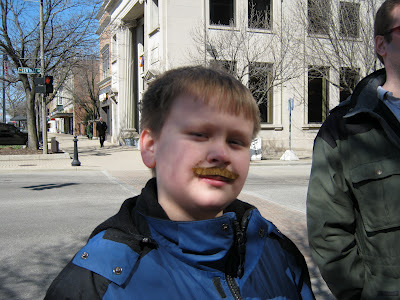Julia Buckley's Blog, page 9
October 21, 2012
Happy Fall, Happy Reading.
Published on October 21, 2012 15:32
October 1, 2012
Invisible Murder
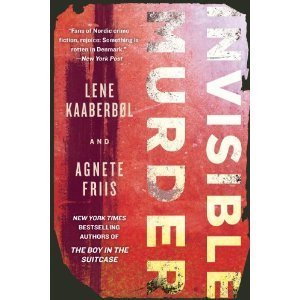 I was very excited to get a copy of this new Nordic thriller in the mail today!! I enjoyed Larsson's Dragon Tattoo trilogy as well as books by Ake Edwardson (interviewed on this blog), Henning Mankell, and Karen Fossum. Now I get to read a book by the "Danish duo" of Lene Kaaberbol and Agnete Friis. I'm very excited to read something from Denmark.
I was very excited to get a copy of this new Nordic thriller in the mail today!! I enjoyed Larsson's Dragon Tattoo trilogy as well as books by Ake Edwardson (interviewed on this blog), Henning Mankell, and Karen Fossum. Now I get to read a book by the "Danish duo" of Lene Kaaberbol and Agnete Friis. I'm very excited to read something from Denmark.Serendipitously, I am teaching Hamlet, and the cover copy of INVISIBLE MURDER says "Something is Rotten in Denmark." :)

Published on October 01, 2012 15:57
French Thriller Writer Franck Thilliez Chats About Sharks, Subliminal Messages and Syndrome E
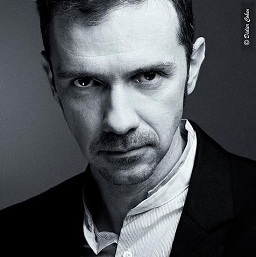 Franck Thilliez's new novel, SYNDROME E, is his first book available in an American translation. The movie rights have been sold to Paintbrush Films.
Franck Thilliez's new novel, SYNDROME E, is his first book available in an American translation. The movie rights have been sold to Paintbrush Films.
Franck, thanks so much for discussing your book with me.
This novel introduced many themes: neuroscience, police work, schizophrenia, parent-child relationships, a computer-oriented world, violent video games, film technology, and subliminal suggestion, to name a few. Do you start a novel knowing all the themes you would like to discuss, or does your research and writing lead you to more and more complicated plots?
Yes, I know, in a general way, the main topics I’ll talk about. Concerning Syndrome E, I wanted to talk about all themes concerning pictures and the impact they have on our brain. So, it concerned movies, video games, subliminal pictures, brain studies… But you’re right: the more I researched, the more I discovered plots that I could talk about, like neuromarketing or the way a movie is made. So, I naturally included them in my story.
Lucie Hennebelle is a single mother of twins; she is also a career cop. This sounds like an almost impossible combination. Do you think that cops, male and female, spend a lot of time feeling guilty about their family obligations?
I know a few cops and I often talk with them about their job. They are people really involved in their work, they like what they’re doing and are proud of it. When you work in the violent crime department, here in France, you can’t say: “I go to work at 8 am and come back home at 5 pm,” because it does not depend on you, but on murderers! If you work on a big case, it will take all your time, day and night, because, you know, the 2 or 3 first days after a crime is committed are the most important: you can’t lose a minute. So, you’ll not be at home, near your family, and your work will consume you. But, most of time, they do not feel guilty, because this job is a part of their life, as much important as their children. It’s not easy to be the wife of a cop (or the husband of a female cop), because, adding to that, this could be a dangerous job…
Someone in the novel suffers from hysterical blindness. I’d heard the term before, but had never really seen it applied to a situation. How common is this condition? How did you research it?
It’s an amazing condition. I heard about it when I talked with a psychiatrist. He said to me: “One day, I treated a woman who did not hear her husband when he talked to her. She heard her children, but she couldn’t hear him! This is what we call hysterical deafness. She’s not really deaf, but her brain makes her believe she is… ” It was amazing. By doing research, I discovered that there were all sorts of such hysterical problems: people thinking they’ve lost a leg or arm, people thinking they’re blind… All those conditions have a psychological explanation and can be solved.
Franck Sharko is a great name for a detective. Did he become Sharko because he is predatory to the bad guys? Or did you have other reasons for giving him this name? (And is there a reason that you share a Christian name?)
Here, in France, most readers ask me : “Why did you call your detective Sharko ?” It’s great that you are American, because you immediately see that in Sharko, there is the English word “Shark." Shark, because Franck Sharko never abandons, he’s really a hunter of killers and will work and work until he catches them! And for the first name, Franck, the same as mine: I just wanted “Franck Sharko” to sound hard, like German. Because he’s a hard guy!
One of the many facts that stood out for me was a film expert’s claim that François Mitterand attempted, in 1988, to subliminally influence voters by splicing his image into the credits of the evening news. How did he achieve this? Did he pay off a producer?
In France, the “Chanel 2” is a public channel, so it belongs to the French State. A president can choose the head of the channel, and he can decide to squelch publicity, … I don’t know how it really happened with François Mitterand, but because he was president since 1980 he had the power to put a subliminal image of himself on the evening news a few weeks before the election of 1988 to re-elect him! You must also know that during this period, there were no laws that forbade someone to use subliminal images in films or advertising…
Wow! How worried should we be, in 2012, that we are being manipulated through the medium of film or things that we see on computer and television screens?
As I say in the book, we must protect our children, who are always watching violent pictures, in video games, on Internet or television. Most of them (under 7 years old) can’t distinguish reality from fiction. With the new technologies (phones, i-pads, Internet), times are changing; now our sons and daughters are growing up with violent pictures around them.
In extreme cases, we can perhaps see the consequence of this in the news: look what happened in Norway with Behring Breivik, look at the different massacres in schools over the last years, or the awful killing in the cinema during the broadcast of Batman, a few days ago. Some killers even try to post their acts on the Internet.
So, I don’t think we are manipulated, I just want to tell people: be careful of all those screen broadcasted pictures; they could be dangerous…
Are you an old film buff yourself? Do you collect films?
When I was 15 years old, and for many years later, I used to watch all horror/thriller/suspense films that would be broadcast on TV! Sometimes, films were broadcast late in the night, and I remember going to bed and setting my alarm clock to wake me up just before the beginning of the film. It was also the period I was a member of a small video club, near my house, so I could rent of all the tapes I wanted. I used to collect video tapes, and then DVDs, but I sold most of them when I grew up, because I needed money! I always loved Hitchcock’s films, Dario Argento, Andrew Romero, David Cronenberg; and nowadays, David Fincher, Christopher Nolan or Ridley Scott are some of my favorite directors.
You must have loved Inception. :)
Your description of Egypt, through Sharko’s eyes, is not flattering—it talked me out of ever visiting Egypt. Have you travelled there?
Talking about the Egypt in tour guides with the Pyramids, Sphinx, nice places in Cairo was not interesting me. A crime novel must be more than a diversion; it must inform readers of the reality of our world. So, I wanted to show the country as it really is. Most of people there are poor; they have difficulties surviving and they live in awful conditions. There are more than 8 shantytowns at the border of the Cairo, containing thousands and thousands of people. I say in the book that the police and government are corrupt. Revolution exploded in Egypt only a few months after the publication of Syndrome E in France, and I proves that I was not completely wrong…
And no, I never travelled there, but did a lot of research on this country, watching Egyptian films, reading books, talking by email with people there.
A small story : I tried to be in contact with the police there, just to ask single things, like “how are you clothed?” or “what are the grades in your police?,” but they never answered, they said top secret!
At one point Lily and Sharko feast on Kentucky Fried Chicken. Is this American chain popular in France?
It’s starting to gain popularity, but it’s not as popular as McDonalds!
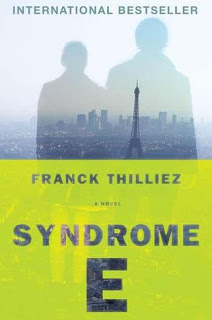 Ah, the ubiquitous McDonalds! :)
Ah, the ubiquitous McDonalds! :)There are many airplane journeys in the novel—Sharko finds them wearying, almost existential experiences—and yet they retain a certain glamour for the reader, linking the characters to far-flung locales. What’s your attitude toward airplane travel? Do you enjoy it?
In the last two years, I travelled a lot because of the publication of my books in many countries. I really like airplane travel. I love being in an airport, seeing people going abroad, and others coming back home. An airport is a particular place where you can touch the world. I read a lot during my travels, and sometimes I write. The most difficult is, of course, the jet lag, but it’s such a good thing to discover new countries and people.
Great point! On to Lucie Henebelle. Lucie is compared, by one character, to Jodie Foster. Are you a Jodie Foster fan? Did you see Lucie Henebelle as sort of similar to Foster’s Clarice Starling? Or do you just like Foster’s combination of toughness and femininity?
I’m absolutely a fan of Jodie Foster! She’s a great actor and she would be perfect for Lucie, the main character of my book, if she were slightly younger. When I created Lucie a few years ago, I had in mind Jodie Foster as she was in The Silence of the Lambs, one of my favorite films.
Who are your literary influences? What are you reading now?
I started by reading Agatha Christie, Arthur Conan Doyle, and classical Anglo-Saxon crime novels. Then I had my period of Stephen King (and still do). He’s a great writer. I spent night after night reading his books, trying to guess how he could frighten us so much. During my studies, I did not read a lot (but was watching films!). I started reading crime novels again 10 years ago. Nowadays, I read Dennis Lehane, Michael Connelly, but also books by John Steinbeck.
If I could make only one journey to France, where should I be sure to go?
Everywhere ! France is a beautiful country, with many cultures, great landscape, big towns but also very quaint villages, where the time has stood still. French food and wine are excellent; just spend time in a little restaurant of Paris or by the sea at Deauville or Cannes!
Sounds lovely! Thank you so much for a terrific read and for answering these questions.
You’re welcome. It was a pleasure.

Published on October 01, 2012 07:50
September 25, 2012
A Blog Visit from Mystery Writer Sandra Balzo

Thanks for inviting me to stop by, and I have to say it's wonderful timing. I write two mystery series--the Maggy Thorsen Coffeehouse Mysteries and Main Street Murders--and I'm currently in that lovely sweet spot between the release of one book (the second Main Street) and writing the eighth Maggy.
All right, to be absolutely honest, I'm shamelessly dragging my feet on the new book and blogging gives me the perfect excuse. I'm the world's worst procrastinator¾probably because I know I can function under deadline thanks to my former life in corporate public relations. When I turned to writing, my first home office was in the laundry room and our clothes were never so clean. Then I moved to the dining room and the dishes were always done and dinner on time.
If you're not familiar with my work, the Maggy books are funny, fast reads--cozies, with a bit of a hard edge. They're set in a gourmet coffeehouse in Wisconsin. The Main Street Murders series is set in the mountains of North Carolina and feature journalist AnnaLise Griggs. Reviewers equate them to the regional mysteries of Joan Hess, Margaret Maron and G.A. McKevett.
In the first Main Street book, RUNNING ON EMPTY, AnnaLise is called home to Sutherton because her mom, Daisy, accidentally bled-out a donor at the local blood drive. When the "accidents" continue, though, it's clear that it's up to AnnaLise to discover whether Daisy is indeed the cause, as everyone else seems to believe, or the target.
In DEAD ENDS, which was just released, AnnaLise's past comes home to roost in the persons of her ex-lover and his wife and daughter. As you might guess, somebody has to die.
Okay, time to work on the new Maggy. Or, as my kids say, "Mom's off to kill somebody again."
FICTIONALLY, of course.
All the best,Sandy
Sandra Balzo is an award-winning author of crime fiction, including nine books in two different mystery series from Severn House--the Wisconsin-based Maggy Thorsen Mysteries and Main Street Murders, set in the High Country of North Carolina and featuring journalist AnnaLise Griggs.
Find Sandy online at www.SandraBalzo.com, Pinterest (http://pinterest.com/sandrabalzo), Facebook (Sandra Balzo Mysteries) and Twitter (@SandraBalzo).

Published on September 25, 2012 17:33
September 19, 2012
Mystery Writer D.E. Johnson Talks About Loving History, Chasing Clues, and Thinking Female
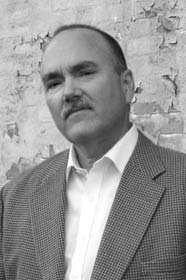
D. E. Johnson's DETROIT BREAKDOWN is available now. Thanks to Tanya Farrell for the great questions and Nicole Johnson for allowing me to use the author photo.
What (or who!) inspired you to write historical mystery/crime novel?
Really there are two different inspirations – the first is my love of history. Ever since elementary school, I’ve been interested in American history. The early Twentieth Century is the time period I find most fascinating. Our country was becoming what it is today—both the good and the bad. It was a time of greatupheaval, with millions of immigrants moving into the cities, manufacturing changing the way everyone lived, and a great awakening about our social responsibility.
The second inspiration was Encyclopedia Brown. I poured over those books as a kid, seeing if I could come up with the clues he found. The books were very imaginative and a lot of fun. The thing I enjoy most about writing mysteries is the cat and mouse game with the reader. A good mystery has to present the clues necessary for the reader to solve the crime, but use misdirection to mask them. I love fitting in those bits and pieces that add up to a murderer, but doing so in a way that keeps the reader from seeing it until the “Aha!” moment.
Detroit Breakdown uses two first-person narratives. What did you find most difficult about keeping Will and Elizabeth's voices distinct?
The most difficult part was trying to think like a woman. I’d written two books already from Will’s head, and it was a very natural voice for me. I was really stepping out on a limb to write Elizabeth’s narration. Fortunately, I have some early readers—including my wife—who have no compunction about telling me when I’m being stupid. I actually learned a bit about women during the process.
I had fun moving from there into stylistic differences. Elizabeth not only thinks differently than Will, she sees storytelling differently as well. Her vocabulary is different, which got me a complaint from my father. He worked with concrete in one way or another his entire working life, and here Elizabeth was calling it “cement?” (I had to point out that Will says “concrete,” and I think my dad has forgiven me.)
You must have done quite a bit of research on Eloise Hospital and mental health treatments during the early 20th century. What parts of your research interested or shocked you the most?
I fell into a rabbit hole filled with radium and uranium. During the early Twentieth Century, Eloise Hospital was one of the pioneers in the use of radiation therapy for tuberculosis. As I researched that (looking for a good way to punish Will for being my protagonist) I found a wealth of information about radioactive curatives.
In the first forty years of the Twentieth Century, many people looked at radiation as a cure-all. You could buy uranium-lined water coolers (or radium water by the bottle, if you had a little more money), as well as a wide variety of, er, Viagra-like radioactive products. I wrote an article about it for Criminal Element, which you can find at: http://www.criminalelement.com/blogs/2012/09/who-needs-viagra-when-you-can-have-a-radium-suppository-d-e-johnson-historical-true-crime-fashion-police-radiation
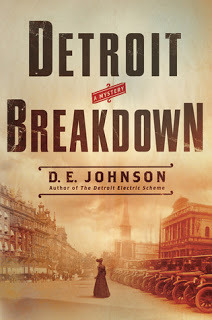 Can you describe your personal attachment to Detroit and the reasons why you have chosen to center all your novels around this great city?
Can you describe your personal attachment to Detroit and the reasons why you have chosen to center all your novels around this great city?
My research made me fall in love with the city. Detroit was rightly known for decades as the “Paris of the West.” Tree-lined boulevards, sophisticated culture, great art scene, Detroit had it all. In 1910, there was no more exciting city in the world. Manufacturing was growing by leaps and bounds, led, of course, by automobiles, but the city was renowned for hundreds of other industries—stoves, train cars, and cigars being three of the most prominent.
In 1910, only 10% of Detroit’s population had even been born in the State of Michigan! The city was a smaller version of New York, filled with ethnic enclaves where many people never had to learn English because everything they needed was right there. Many of those immigrants were craftsmen, lured to the New World by the promise of a better life.
Along with all this came crime—white collar (led by the city government), blue collar, and everything in between. Labor activists, socialists, and anarchists were ruthlessly cut down by the establishment, and fought back every way they knew how. The city was prosperous, yet so many of its citizens were destitute. It was a perfect mixture for the extremes of human behavior—exactly the environment a novelist is looking for.
All of your novels involve a theme related to history - organized crime, the electric car industry, mental health - what themes do you have in store for future books?
The fourth book in the series (untitled as of yet), which will be published in Fall 2013, will revolve around women’s suffrage and the 1912 Presidential election. In real life, Michigan had a constitutional amendment on the ballot to allow women the vote, and everyone was certain it was a shoo-in. Suffrage was well-supported throughout the state, and the election was thought to be merely a formality.
But the amendment was voted down. Amid the public outcry of a fix, the governor demanded a recount. Tens of thousands of ballots were “lost” and thousands more were disqualified because they were printed incorrectly. The Macomb County Licensed Beverage Association was found to be involved in a conspiracy to defeat the amendment, and most thought the Michigan Licensed Beverage Association was the force behind it. (Suffrage and Prohibition were considered to be nearly one and the same.) Nothing was ever proved, but I’ve made up my mind as to what happened.
Once I finish this book, I think I am going to start a new series in a new city. I do have an idea for Will Anderson #5, which will take Will into the sticky problem of race relations. I’ve been setting up this story for two books, so it’s there waiting. Right now I have my blinders on, though.

Published on September 19, 2012 12:58
August 27, 2012
Mystery Writer Larissa Reinhart on Coffin Portraits, Japanese Adoptions, and Funny Brits
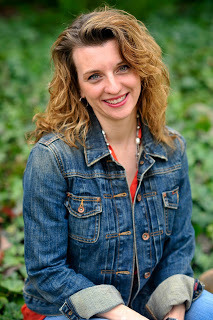 Larissa Reinhart's new mystery, Portrait of a Dead Guy, is out today! Here's our interview about her book.
Larissa Reinhart's new mystery, Portrait of a Dead Guy, is out today! Here's our interview about her book.Hi, Larissa! Thanks for agreeing to be on the blog, and for discussing your book, PORTRAIT OF A DEAD GUY, with me.
You write funny! They say that writing humor is the hardest kind of writing. How did you choose to write a humorous narrative, and how do you maintain your funny narration and dialogue?
To be honest, that’s just how Cherry speaks in my mind. She kind of talks out the side of her mouth and uses these descriptive phrases. I love humorous books, so I probably absorbed a lot of humor through reading-osmosis. If I’m having a bad day, I like a good dose of PG Wodehouse or Jasper Fforde. If only I could reach UK-humor level... Brits are hilarious people. I love their dry wit. I’m not so subtle.
Two of my favorites! The premise of your book is unusual . A struggling artist snags the job of painting a recently-murdered man, in his coffin, as a memorial for the rather odd family. Therefore, your heroine Cherry Tucker has to spend a significant amount of time with a stiff. Did this situation strike you as funny or horrifying?
It strikes me as funny, but when I explain the plot I get a lot of “are you a lunatic?” looks. I think I’d rather paint a stiff than take on a killer. That would be horrifying!
One of my favorite characters is a billy goat named Tater, who seems to make it his life’s ambition to annoy visitors (or maybe just Cherry?). Do you have some experience with goats and their whims?
My personal goat stories are fairly innocuous. However, goats have a love/hate relationship with my sister. As children, any time we were near goats they would flock to her, knocking her down, and attempt to eat her clothes. To this day if we take our children to a petting zoo, she refuses to have anything to do with the goats. She was horrified to hear I had a goat in my story. But I believe in making lemonade from other people’s lemons.
Haha! Speaking of sisters, I like the relationship between Cherry and her sister. Cherry is fiercely ambitious, but Casey “couldn’t find ambition if it drew her a map and hired a Sherpa.” Do you have sisters, and if so, did you draw from the relationships to write about these women?
I have one sister who is nothing like Casey. She’s a hard worker and a great mom. But I can relate to the sniping and one-upmanship between the siblings. My sister and I don’t do that anymore, but we had some memorable arguments in high school. Because their mother abandoned them as children and they then lost their grandmother when they were in high school, I see the siblings as emotionally stunted. However, they’re all very creative. Cherry’s a talented artist, Casey is an amazing cook, and Cody is a skilled mechanic. Unfortunately, Cherry’s the only one who wants to make her mark in the world. Or start paying her own bills.
There are a number of men in Cherry’s life—specifically her ex-husband, Todd, to whom she was married “by accident,” and of course the handsome Luke. It reminds me of the interesting triangle Janet Evanovich creates between Stephanie Plum, Ranger, and Morelli. Have other people compared you to Evanovich?
You just made my year! I’m such an Evanovich fan. My sister mentioned it to me when she first read the manuscript, but I didn’t think about any parallels when writing. Originally, Todd (Cherry’s ex-husband) was just going to be a jerky character that popped up and harassed Cherry every now and then. But he turned out to be this adorable guy who was so sweet. Even though Cherry’s not certain if he’s playing a dumb blonde act to sneak back in her life, how could I say no to letting Todd hang around? He’s such a cutie.
In your first sentence, you say that “in a small town, there is a thin gray line between personal freedom and public ruin.” Are you from a small town? And do you know whereof you speak? J
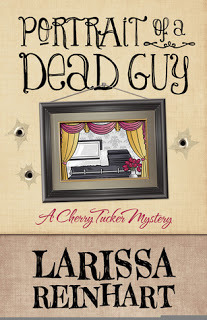 My hometown is even smaller than Cherry’s. I’m from a farming village called Andover with a population of 600. Luckily, I have not suffered from public ruin (I don’t think), but not much goes by without comment. Of course, nobody gossips. Knowledge of other people’s affairs just seems to hover in the air. More like humidity than smog.
My hometown is even smaller than Cherry’s. I’m from a farming village called Andover with a population of 600. Luckily, I have not suffered from public ruin (I don’t think), but not much goes by without comment. Of course, nobody gossips. Knowledge of other people’s affairs just seems to hover in the air. More like humidity than smog.Who are some writers you admire? And who’s writer who makes you laugh the loudest?
I could not fit all the names of writers I admire without tying up the internet lines. I love the early-mid twentieth century mystery/suspense writers like Agatha Christie, Ngaio Marsh, Dick Francis, Mary Stewart, Colin Dexter, Barbara Michaels and Daphne du Maurier. I also love mysteries by Martha Grimes, P.D. James, Nancy Martin, and Sharyn McCrumb. For humor, I mentioned PG Wodehouse and Jasper Fforde earlier. I even find Agatha Christie and Colin Dexter funny. Of course, Janet Evanovich kills me. Meg Cabot and Charlaine Harris, too. Darynda Jones has me rolling now.
We share many of the same favorites!! What are you reading now?
Darynda Jones’ Charley Davidson series. I love series, and I love to read them all at once, so sometimes I’ll hold out for a bunch of titles before jumping in. Especially if I know they’re going to be good.
You are an extremely well-travelled person. What’s your favorite place in the world (aside from your home, of course?)
That’s hard! But I’m going to say Japan, because we’ve lived there three times, so Japan has a special place in our hearts. We just moved back to Georgia from Nagoya a year ago at Christmas, and we’re still homesick for Nagoya.
You’ve taught English and history. Are you still teaching?
Eight years ago we adopted our first daughter from China, and I’ve stayed at home since. I dedicated myself to writing once the girls started school (we were actually in Japan at that time). I feel very blessed to have time with them, help at their school, and write. I realize how lucky I am!
Where can readers find out more about you and PORTRAIT OF A DEAD GUY?
I’m easy to find on the internet, because I’m usually in front of my computer. My website is http://larissareinhart.com/ and my blog about life in Japan is http://theexpatreturneth.blogspot.com/, but I’m often chatting on Facebook, Twitter, Goodreads, or pinning on Pinterest. Cherry Tucker has her own Pinterest account because she took over half of my boards.
I’m also in a group called Little Read Hens, where we do a book chat on Facebook on Wednesdays. It’s a lot of fun, so feel free to join us!
Thanks so much for having me on your blog! Your interview was a lot of fun and gave me some good questions to chew on (mentally, of course)!
You're welcome! Thanks for a fun read, and good luck with the book!

Published on August 27, 2012 23:00
August 1, 2012
French Thriller Writer Franck Thilliez Chats About Sharks, Subliminal Messages and Syndrome E
 Franck Thilliez's new novel, SYNDROME E, is his first book available in an American translation. The movie rights have been sold to Paintbrush Films.
Franck Thilliez's new novel, SYNDROME E, is his first book available in an American translation. The movie rights have been sold to Paintbrush Films.
Franck, thanks so much for discussing your book with me.
This novel introduced many themes: neuroscience, police work, schizophrenia, parent-child relationships, a computer-oriented world, violent video games, film technology, and subliminal suggestion, to name a few. Do you start a novel knowing all the themes you would like to discuss, or does your research and writing lead you to more and more complicated plots?
Yes, I know, in a general way, the main topics I’ll talk about. Concerning Syndrome E, I wanted to talk about all themes concerning pictures and the impact they have on our brain. So, it concerned movies, video games, subliminal pictures, brain studies… But you’re right: the more I researched, the more I discovered plots that I could talk about, like neuromarketing or the way a movie is made. So, I naturally included them in my story.
Lucie Hennebelle is a single mother of twins; she is also a career cop. This sounds like an almost impossible combination. Do you think that cops, male and female, spend a lot of time feeling guilty about their family obligations?
I know a few cops and I often talk with them about their job. They are people really involved in their work, they like what they’re doing and are proud of it. When you work in the violent crime department, here in France, you can’t say: “I go to work at 8 am and come back home at 5 pm,” because it does not depend on you, but on murderers! If you work on a big case, it will take all your time, day and night, because, you know, the 2 or 3 first days after a crime is committed are the most important: you can’t lose a minute. So, you’ll not be at home, near your family, and your work will consume you. But, most of time, they do not feel guilty, because this job is a part of their life, as much important as their children. It’s not easy to be the wife of a cop (or the husband of a female cop), because, adding to that, this could be a dangerous job…
Someone in the novel suffers from hysterical blindness. I’d heard the term before, but had never really seen it applied to a situation. How common is this condition? How did you research it?
It’s an amazing condition. I heard about it when I talked with a psychiatrist. He said to me: “One day, I treated a woman who did not hear her husband when he talked to her. She heard her children, but she couldn’t hear him! This is what we call hysterical deafness. She’s not really deaf, but her brain makes her believe she is… ” It was amazing. By doing research, I discovered that there were all sorts of such hysterical problems: people thinking they’ve lost a leg or arm, people thinking they’re blind… All those conditions have a psychological explanation and can be solved.
Franck Sharko is a great name for a detective. Did he become Sharko because he is predatory to the bad guys? Or did you have other reasons for giving him this name? (And is there a reason that you share a Christian name?)
Here, in France, most readers ask me : “Why did you call your detective Sharko ?” It’s great that you are American, because you immediately see that in Sharko, there is the English word “Shark." Shark, because Franck Sharko never abandons, he’s really a hunter of killers and will work and work until he catches them! And for the first name, Franck, the same as mine: I just wanted “Franck Sharko” to sound hard, like German. Because he’s a hard guy!
One of the many facts that stood out for me was a film expert’s claim that François Mitterand attempted, in 1988, to subliminally influence voters by splicing his image into the credits of the evening news. How did he achieve this? Did he pay off a producer?
In France, the “Chanel 2” is a public channel, so it belongs to the French State. A president can choose the head of the channel, and he can decide to squelch publicity, … I don’t know how it really happened with François Mitterand, but because he was president since 1980 he had the power to put a subliminal image of himself on the evening news a few weeks before the election of 1988 to re-elect him! You must also know that during this period, there were no laws that forbade someone to use subliminal images in films or advertising…
Wow! How worried should we be, in 2012, that we are being manipulated through the medium of film or things that we see on computer and television screens?
As I say in the book, we must protect our children, who are always watching violent pictures, in video games, on Internet or television. Most of them (under 7 years old) can’t distinguish reality from fiction. With the new technologies (phones, i-pads, Internet), times are changing; now our sons and daughters are growing up with violent pictures around them.
In extreme cases, we can perhaps see the consequence of this in the news: look what happened in Norway with Behring Breivik, look at the different massacres in schools over the last years, or the awful killing in the cinema during the broadcast of Batman, a few days ago. Some killers even try to post their acts on the Internet.
So, I don’t think we are manipulated, I just want to tell people: be careful of all those screen broadcasted pictures; they could be dangerous…
Are you an old film buff yourself? Do you collect films?
When I was 15 years old, and for many years later, I used to watch all horror/thriller/suspense films that would be broadcast on TV! Sometimes, films were broadcast late in the night, and I remember going to bed and setting my alarm clock to wake me up just before the beginning of the film. It was also the period I was a member of a small video club, near my house, so I could rent of all the tapes I wanted. I used to collect video tapes, and then DVDs, but I sold most of them when I grew up, because I needed money! I always loved Hitchcock’s films, Dario Argento, Andrew Romero, David Cronenberg; and nowadays, David Fincher, Christopher Nolan or Ridley Scott are some of my favorite directors.
You must have loved Inception. :)
Your description of Egypt, through Sharko’s eyes, is not flattering—it talked me out of ever visiting Egypt. Have you travelled there?
Talking about the Egypt in tour guides with the Pyramids, Sphinx, nice places in Cairo was not interesting me. A crime novel must be more than a diversion; it must inform readers of the reality of our world. So, I wanted to show the country as it really is. Most of people there are poor; they have difficulties surviving and they live in awful conditions. There are more than 8 shantytowns at the border of the Cairo, containing thousands and thousands of people. I say in the book that the police and government are corrupt. Revolution exploded in Egypt only a few months after the publication of Syndrome E in France, and I proves that I was not completely wrong…
And no, I never travelled there, but did a lot of research on this country, watching Egyptian films, reading books, talking by email with people there.
A small story : I tried to be in contact with the police there, just to ask single things, like “how are you clothed?” or “what are the grades in your police?,” but they never answered, they said top secret!
At one point Lily and Sharko feast on Kentucky Fried Chicken. Is this American chain popular in France?
It’s starting to gain popularity, but it’s not as popular as McDonalds!
 Ah, the ubiquitous McDonalds! :)
Ah, the ubiquitous McDonalds! :)There are many airplane journeys in the novel—Sharko finds them wearying, almost existential experiences—and yet they retain a certain glamour for the reader, linking the characters to far-flung locales. What’s your attitude toward airplane travel? Do you enjoy it?
In the last two years, I travelled a lot because of the publication of my books in many countries. I really like airplane travel. I love being in an airport, seeing people going abroad, and others coming back home. An airport is a particular place where you can touch the world. I read a lot during my travels, and sometimes I write. The most difficult is, of course, the jet lag, but it’s such a good thing to discover new countries and people.
Great point! On to Lucie Henebelle. Lucie is compared, by one character, to Jodie Foster. Are you a Jodie Foster fan? Did you see Lucie Henebelle as sort of similar to Foster’s Clarice Starling? Or do you just like Foster’s combination of toughness and femininity?
I’m absolutely a fan of Jodie Foster! She’s a great actor and she would be perfect for Lucie, the main character of my book, if she were slightly younger. When I created Lucie a few years ago, I had in mind Jodie Foster as she was in The Silence of the Lambs, one of my favorite films.
Who are your literary influences? What are you reading now?
I started by reading Agatha Christie, Arthur Conan Doyle, and classical Anglo-Saxon crime novels. Then I had my period of Stephen King (and still do). He’s a great writer. I spent night after night reading his books, trying to guess how he could frighten us so much. During my studies, I did not read a lot (but was watching films!). I started reading crime novels again 10 years ago. Nowadays, I read Dennis Lehane, Michael Connelly, but also books by John Steinbeck.
If I could make only one journey to France, where should I be sure to go?
Everywhere ! France is a beautiful country, with many cultures, great landscape, big towns but also very quaint villages, where the time has stood still. French food and wine are excellent; just spend time in a little restaurant of Paris or by the sea at Deauville or Cannes!
Sounds lovely! Thank you so much for a terrific read and for answering these questions.
You’re welcome. It was a pleasure.

Published on August 01, 2012 07:50
July 28, 2012
Robert Fate's Latest is Deeply Satisfying
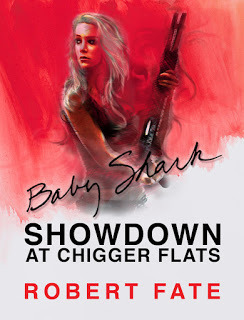 Baby Shark is back, and this time Kristin Van Dijk is not the shell-shocked seventeen-year-old that she was at the beginning of this series. She's tough, and she doesn't back down from a fight, and the men continue to underestimate her to their own peril.
Baby Shark is back, and this time Kristin Van Dijk is not the shell-shocked seventeen-year-old that she was at the beginning of this series. She's tough, and she doesn't back down from a fight, and the men continue to underestimate her to their own peril.I love the relationship between Kristin and Otis, and the backdrop of 1960 Fort Worth (and the intense heat of Texas) made this an especially fun read for this hot, hot summer.
Here's the link to this great read:
http://www.amazon.com/dp/B008MO6Q6I
What are you waiting for? Read and enjoy.

Published on July 28, 2012 13:33
July 17, 2012
Mystery Writer Charles Salzberg on Making Connections, Writing Hard Boiled, and Loving Literature
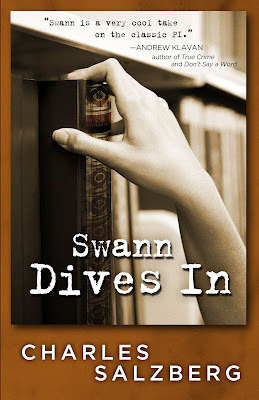 Charles Salzberg was nominated for a Shamus Award for Best First P.I. Novel for his book Swann's Last Song. In October he will release the second in the series, called Swann Dives In. He found a moment in his busy (and hot) summer to answer some questions.
Charles Salzberg was nominated for a Shamus Award for Best First P.I. Novel for his book Swann's Last Song. In October he will release the second in the series, called Swann Dives In. He found a moment in his busy (and hot) summer to answer some questions.Your character’s name is Henry Swann. This last name has been versatile for your clever titles—(Swann’s Last Song, Swann Dives In), but are there any other reasons why you chose this as the moniker for your detective?
It sounded right to me, kind of slid off the tongue, and I wanted to have the literary allusion to Proust’s Swann character. Originally, I didn’t even use Swann’s name in the second book--it was called Bad Reception--but someone suggested I “brand” the series by using the name in each title and so I acquiesced.
This book is set in the present, but it reads like a 1940s P.I. novel (which I assume is the style you’re going for). Who’s your favorite hard-boiled PI? Some passages read like homages to Chandler’s Marlowe, so I’m guessing he’s one?
Definitely Chandler, but I was also very influenced by Dashiell Hammett and Ross MacDonald. I’m also a big fan of the pulp fiction writers like Big Jim Thompson and James M. Cain. But there are lots of other, non-detective writer influences, as well. Thomas Berger’s Who Killed Teddy Villanueva? is one of them, and also Vladimir Nabokov (there are lots of literary allusions throughout both books,) and even a little Phillip Roth thrown in for good measure.
I love Ross MacDonald! And interestingly, Ake Edwardson (who was just interviewed here recently) also mentions Nabokov as an influence.
In this book, when he’s not investigating, Swann is hooking up cable. What made you choose this alternate profession?
In the original ending of the first book, Swann is so disillusioned by what happened (he followed all the clues, but didn’t solve the crime because it was totally random) that he leaves the business. I wanted him to have a job that was still hooking things up (looking for connections, making connections) and I wanted to bring him into the “real” world, which is now technological. In effect, he’s doing the same thing he did before: making connections.
At one point Swann surmises that “Isolation [is] now impossible . . . maybe the less we know about others, the better off we are.” Does Swann’s view of modernity reflect some of your own views, or is this distinct to his character?
I wish I were Swann--obviously parts of me are him--but he’s much brasher and braver than I am. And he’s also able to articulate and broadcast things about himself and other people that I wish I could. But I do think there’s truth to that statement. The more we know about people, the more chance there is for us to be disappointed. In terms of modernity, I think I’m much more willing to embrace change than he is. But to me, that’s what makes him charming and fun to write.
The plot of the book deals with the world of rare books. Did you have to research this for your novel, or was this already an interest of yours?
I interviewed a rare book dealer named Darren Winston, who was extremely helpful. Obviously, being a writer and an English major, I knew a lot about the authors mentioned in the book and a whole bunch of the literary anecdotes, but not so much about the world of rare books. So, I also read a number of articles, in the New Yorker, in the New York Times, and every time I saw something that had anything to do with rare books, I tore it out and saved it. I also searched the Internet for information and I studied the Bauman rare book dealer ads on the back page of the New York Times Book Review for an idea of present prices for books. But obviously, I made up certain values for books, but they’re pretty close.
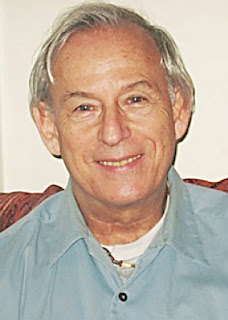 English majors rule! J
English majors rule! J
What made you start writing a mystery series?
I had no intention of writing a mystery series. When I was starting out I wrote very literary, very character-oriented novels, not strong on plot. I wanted to see if I could write a plot-oriented book, and the best challenge I could find was to write a mystery or detective novel because those depend very heavily on plot. I wrote Swann’s Last Song, which I thought of as an anti-detective novel, because in the original version Swann does not solve the case. But publishers wouldn’t buy that, so I had to rewrite the ending (you can find both endings in the paperback version.) I was amazed when it was nominated for a Shamus Award for Best First PI Novel, and when I lost, I got pissed off and decided to write another. It turns out, they’re fun to write and I have a lot of leeway now in what I can write about.
How many books will there be in the Swann series?
I thought I only had three books in me, because I couldn’t think of anything past a third title--the one I’m working on is tentatively titled, Swann’s Lake of Despair--but now I think as long as I can come up with a good plot and a fun title, I’ll keep doing them.
What are you reading right now?
I just finished reading Jeff Guin’s Go Down Together, about Bonnie and Clyde. And Berlin Noir, by Phillip Kerr. On my shelf to read is The Art of Fielding and Just Kids, among many, many others.
Swann travels a lot in his quest. If you could travel anywhere this summer, where would you go?
The funny thing is, I’m not really big on travel, which is probably why I have Swann travel at the drop of a hat. But if pressed, I’d probably say Ireland and England, because I wouldn’t be language challenged, and Italy, because I’ve never been there and it looks so good in movies.
Where can readers find out more about you and the Swann mysteries?
A friend of mine, Francesca Rizzo, put together a terrific website, HenrySwann.com, that’s interactive and great fun--primarily because another friend of mine, Ross Klavan, along with Fran, did the various voices of Swann and characters in the book. She’s now working on another page for the site that’ll be devoted to Swann Dives In.Thanks for chatting, Charles! Good luck with the Swann series.

Published on July 17, 2012 12:44
July 15, 2012
A Mustache Creates Intrigue
Published on July 15, 2012 13:18


